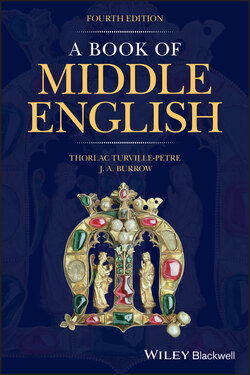Читать книгу A Book of Middle English - J. A. Burrow - Страница 57
5.3.2 Genitive
ОглавлениеThe genitive indicates possession: þe kinges halle, 5/410, þas monnes earen, ‘the ears of the man’, 2/338; or definition: Ancrene Wisse, ‘Guide for Anchoresses’ (with genitive pl. ending ‐ene).
Occasionally the genitive is without ending (4.2.4), though often the relationship between the nouns is not clearly distinguishable from that of a noun‐compound where two nouns are in parallel. So while Uryn son, ‘Urien’s son’, 9/113, has an endingless genitive proper name, sister sunes, ‘nephews’, 9/111, might be analysed as ‘sister’s sons’ or ‘sister‐sons’. More clearly compounds are munster dor, 8/268, and sumere dale, 2/1.
The use of the of‐phrase as an alternative way of indicating possession or definition becomes increasingly common. Compare the early Stephnes kinges time, 1/74–5, with the later expressions þe face of frelych dryʒtyn, 8/214, þe termes of Judé, 8/61.
In a few texts, mainly from the South‐West Midlands, the genitive inflexion is replaced by his. In this book it is found only in Trevisa: God hys heste, ‘God’s commandment’, 12/167; Seint Gregore hys bokes Dialoges, ‘St Gregory’s books “The Dialogues”’, 12/121–2. The construction becomes common for a time in Early Modern English.
Two or more genitive nouns may be in parallel: He wes Uðeres þas aðelen kinges, ‘It had been the noble king Uther’s’, 3/18. If the noun that governs the genitive expression is also present, the genitive group often splits around it, and only the first element is inflected, as in this example where love governs both lordes and Sir Orfeo, but the name is not inflected: mi lordes love Sir Orfeo, ‘my lord Sir Orfeo’s love’, 5/518. With the same word‐order is for the Lordes love of hevene, ‘for the love of the Lord of heaven’, 7b/16.
The genitive is used with superlative adjectives: læðest alre þinge, ‘most hateful of all things’, 3/33 (OE genitive pl. þinga); aðelest kinge, ‘noblest of kings’, 3/53. Later of becomes standard: þe fairest of every kinne, 14a/7.
Adverbial uses of the genitive are most common in expressions of time: þu fliʒst niʒtes (genitive sg.), ‘you fly at night’, 2/238 (compare flo bi niʒte, 2/390). In be nihtes and be dæies, 1/17–18, the writer reinforces the adverbial genitive with a preposition. Other adverbial uses are hire þonkes, ‘willingly’, 2/70, wintres and sumeres, ‘in the winter and in the summer’, i.e. ‘all the time’, 3/170, nanes weis, ‘in no way, not at all’, 4/16.
After numbers the ‘partitive genitive’ is found, especially in early texts: fif and twenti þusend / Wihtere monnen, ‘25,000 (of ) bold men’, 3/124–5. By contrast, the genitive is often not used with nouns such as score, maner, kin: such manere argement, ‘such kind of argument’, 12/88, alle kyn craftes, ‘all kinds of trades’, 7b/58.
In early texts the genitive is occasionally used after some adjectives, such as ful, ‘full’, and unilic: ælchen oðere unilic, ‘unlike all others’, 3/19.
